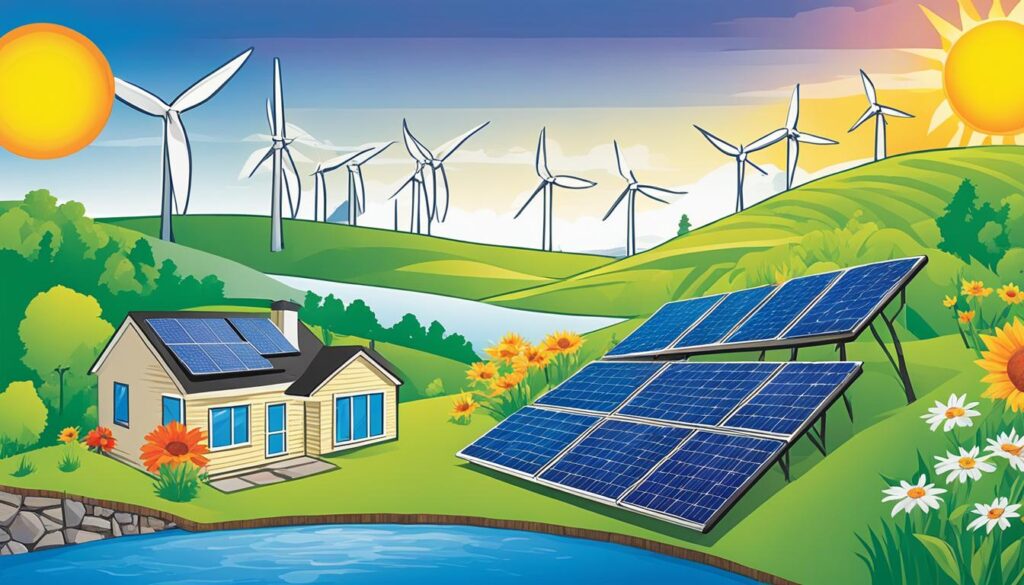
As I continue to explore ways to embrace sustainable living practices, one solution stands out as both environmentally friendly and economically beneficial: solar energy. Solar power has gained significant attention in recent years for its ability to provide clean and renewable energy, reducing our reliance on non-renewable sources. In this article, I will delve into the advantages of solar energy for sustainable living and how it can positively impact our lives and the environment.
Key Takeaways:
- Solar energy is a sustainable solution that aligns perfectly with environmentally conscious living.
- Advantages of solar energy include clean and renewable energy, reduced electricity bills, and energy independence.
- Embracing solar energy can bring financial benefits through savings, incentives, and the potential to sell excess energy back to the grid.
- Solar energy has a minimal environmental impact, reducing greenhouse gas emissions and combatting climate change.
- Solar energy solutions are available for residential and commercial use, including solar panels, solar water heaters, and solar-powered outdoor lighting.
The Advantages of Solar Energy for Sustainable Living
Solar energy offers numerous advantages for sustainable living. It is a clean and renewable source of energy that does not produce harmful emissions or contribute to climate change. By harnessing the power of the sun, solar energy provides a sustainable and eco-friendly solution to meet our energy needs.
One of the key benefits of solar energy is its ability to significantly reduce electricity bills. By installing solar panels on rooftops, the unused space can be utilized for energy generation. This not only reduces dependence on non-renewable energy sources but also provides homeowners with energy independence. The energy generated from solar panels can power appliances and devices, allowing individuals to enjoy the benefits of renewable energy without relying on traditional electricity grids.
Solar energy systems also require minimal maintenance and have a long lifespan, making them a cost-effective choice for homeowners. Once installed, solar panels can continue to generate electricity for many years without major upkeep. This not only saves money but also contributes to sustainable living by reducing waste and the need for frequent replacements.
The advantages of solar energy extend beyond financial savings and sustainability. The use of solar energy helps to reduce reliance on fossil fuels, decrease greenhouse gas emissions, and combat climate change. Solar energy plays a crucial role in creating a cleaner and greener future for the planet.
In summary, solar energy offers numerous advantages for sustainable living. From cost savings to environmental impact, solar energy provides a clean and renewable source of power. By embracing solar energy solutions, individuals can contribute to a more sustainable future while enjoying the benefits of clean and reliable energy.
Financial Benefits of Solar Energy
Embracing solar energy can bring significant financial benefits. According to an article on EIN Presswire, the biogas market is estimated to reach USD 65.53 billion by 2023. Solar energy systems can result in substantial savings on electricity bills, as they produce free energy from the sun.
In some cases, excess energy can be sold back to the grid, further offsetting costs. Additionally, the installation of solar panels may be eligible for tax incentives and rebates, making it an even more financially attractive option for sustainable living.

Key Financial Benefits of Solar Energy:
- Significant savings on electricity bills by harnessing free solar energy
- Potential to sell excess energy back to the grid for additional savings
- Tax incentives and rebates for solar panel installation
By utilizing solar energy, individuals can not only contribute to a sustainable future but also enjoy the financial advantages it brings. Whether it’s reducing monthly electric bills or taking advantage of tax incentives, solar energy is a wise investment for those seeking both environmental and financial benefits.
Environmental Impact of Solar Energy
Solar energy has a minimal environmental impact compared to traditional energy sources. It offers a sustainable solution that reduces greenhouse gas emissions, decreases reliance on fossil fuels, and helps combat climate change. By harnessing the power of the sun, solar energy promotes a cleaner and greener future, protecting the environment for future generations.
The Benefits of Solar Energy for the Environment
- Reduces greenhouse gas emissions: Solar energy systems do not produce harmful emissions and help mitigate the greenhouse effect, contributing to the reduction of global warming.
- Decreases reliance on fossil fuels: By utilizing solar energy, we reduce the need for fossil fuel extraction and consumption, preserving natural resources and reducing environmental harm and pollution.
- Supports renewable energy sources: Solar energy is a prime example of utilizing renewable resources, such as sunlight, to generate clean and sustainable energy.
- Combats climate change: Solar energy plays a vital role in combating climate change by contributing to the reduction of carbon emissions and promoting a low-carbon economy.
Statistics on Solar Energy and Environmental Impact
| Solar Energy Statistic | Environmental Impact |
|---|---|
| Solar energy reduces greenhouse gas emissions by up to 90% compared to fossil fuels. | Significant reduction in carbon footprint and decreased contribution to global warming. |
| Solar energy reduces water consumption compared to traditional power plants. | Conserves water resources and helps protect aquatic ecosystems. |
| Solar energy reduces air pollution, improving air quality and human health. | Better respiratory health, reduced air pollution-related illnesses. |
Overall, solar energy offers a sustainable and environmentally friendly alternative to conventional energy sources. By embracing solar energy, we can contribute to a healthier planet and ensure a brighter future for generations to come.

Solar Energy Solutions for Sustainable Living
When it comes to sustainable living, solar energy offers a range of solutions that empower individuals to make a positive impact on the environment while enjoying the benefits of renewable energy. By harnessing the power of the sun, solar energy systems provide clean and efficient alternatives to traditional energy sources.
1. Solar Panels for Electricity Generation
Solar panels are a popular choice for homeowners and businesses looking to reduce their reliance on non-renewable energy sources. These panels convert sunlight into electricity, which can then power appliances and devices. By installing solar panels on residential or commercial buildings, individuals can actively contribute to sustainable living by generating their own clean energy.
2. Solar Water Heaters for Energy-Efficient Warmth
Another solar energy solution for sustainable living is the use of solar water heaters. These systems harness the sun’s energy to heat water, reducing the need for conventional water heating methods that depend on non-renewable resources. Solar water heaters provide an energy-efficient and cost-effective way to meet hot water demands while reducing environmental impact.
3. Solar-Powered Outdoor Lighting for a Greener Landscape
Solar-powered outdoor lighting is an innovative solution that combines aesthetic appeal with sustainable living. These lighting systems use solar energy to illuminate pathways, gardens, and outdoor areas, allowing individuals to enjoy well-lit spaces without relying on grid electricity. By utilizing solar-powered outdoor lighting, individuals can enhance the beauty of their surroundings while embracing eco-friendly practices.
These solar energy solutions offer practical and effective ways for individuals to embrace sustainable living. By reducing reliance on non-renewable energy sources and minimizing environmental impact, solar energy is a key component of a greener, more sustainable future.
Overcoming Challenges and Expanding Solar Adoption
While solar energy offers numerous benefits for sustainable living, there are important challenges to overcome in order to achieve widespread solar adoption. These challenges include:
- Initial Cost: The upfront cost of installing solar panels can be a significant barrier for many individuals and businesses. However, it is important to note that the cost of solar panels has been steadily decreasing in recent years, making them more accessible to a wider range of consumers.
- Limited Sunlight: Certain areas may have limited sunlight, which can impact the efficiency and effectiveness of solar energy systems. However, advancements in solar technology, such as improved panel efficiency and energy storage solutions, are helping to address this challenge and make solar energy viable in a wider range of geographical locations.
- Educational Awareness: Proper education and awareness about the benefits of solar energy are crucial for driving solar adoption. Many people may still be unaware of the financial incentives, environmental benefits, and long-term savings associated with solar energy. Increasing public education and awareness campaigns can help overcome this challenge and encourage more individuals to embrace solar energy.
Despite these challenges, the future of solar adoption looks promising. Advancements in technology, decreasing costs of solar panels, and government initiatives promoting renewable energy are all working together to overcome these barriers and accelerate the expansion of solar adoption worldwide.
Government Incentives and Support
One of the key drivers for solar adoption is the support and incentives provided by governments around the world. Many countries have implemented policies and regulations that promote the use of renewable energy sources, including solar power.
Government initiatives such as tax credits, grants, and feed-in tariffs incentivize individuals and businesses to install solar panels and invest in solar energy systems. These financial incentives help offset the initial cost of installation and make solar energy a more financially viable option for consumers.
Furthermore, governments are increasingly setting renewable energy targets and implementing regulations that require a certain percentage of electricity to be generated from renewable sources, including solar power. These policies create a supportive environment for solar adoption and encourage businesses and individuals to invest in solar energy solutions.
The Future of Solar Adoption
The future of solar adoption looks promising as the barriers to entry continue to be addressed and awareness about the benefits of solar energy grows. According to the Grand View Research, the biogas market is expected to have a compound annual growth rate (CAGR) of more than 4% between 2024 and 2030. As solar technology continues to improve and costs continue to decrease, solar energy will become an increasingly attractive option for individuals and businesses seeking sustainable and cost-effective energy solutions.
With the right support from governments, increased public awareness, and ongoing technological advancements, solar adoption will continue to expand, contributing to a more sustainable and environmentally friendly future.
| Challenges | Ways to Overcome |
|---|---|
| Initial Cost | Decreasing costs of solar panels over time |
| Limited Sunlight | Advancements in solar technology, improved panel efficiency, and energy storage solutions |
| Educational Awareness | Increased public education and awareness campaigns |
Conclusion
In conclusion, solar energy and sustainable living are a perfect match. By embracing solar energy solutions, individuals can enjoy numerous benefits while contributing to a cleaner and greener future. Solar energy offers financial savings through reduced electricity bills and potential incentives. It also promotes environmental sustainability by reducing greenhouse gas emissions and combatting climate change.
Furthermore, solar energy provides energy independence, allowing individuals to rely less on non-renewable energy sources. Despite some challenges, such as initial installation costs and limited sunlight in certain areas, the increasing adoption of solar energy and the projected growth of the biogas market highlight the growing importance of sustainable living practices.
Embracing solar energy is a powerful step towards a more sustainable and eco-friendly lifestyle, benefiting both individuals and the planet. By harnessing the power of the sun, we can create a brighter future for generations to come.
FAQ
What is solar energy?
Solar energy is a clean and renewable source of energy that is generated by harnessing the power of the sun. It can be converted into electricity or used to heat water, offering a sustainable alternative to traditional energy sources.
What are the benefits of solar energy for sustainable living?
Solar energy offers numerous advantages for sustainable living. It is a clean and renewable source of energy that does not produce harmful emissions or contribute to climate change. It can significantly reduce electricity bills and provide energy independence. Solar panels can be installed on rooftops, utilizing unused space for energy generation. Additionally, solar energy systems require minimal maintenance and have a long lifespan, making them a cost-effective and sustainable choice for homeowners.
Can solar energy save me money?
Yes, embracing solar energy can bring significant financial benefits. Solar energy systems can result in substantial savings on electricity bills, as they produce free energy from the sun. In some cases, excess energy can be sold back to the grid, further offsetting costs. Additionally, the installation of solar panels may be eligible for tax incentives and rebates, making it an even more financially attractive option for sustainable living.
What is the environmental impact of solar energy?
Solar energy has a minimal environmental impact compared to traditional energy sources. It reduces greenhouse gas emissions, decreases reliance on fossil fuels, and helps combat climate change. By harnessing the power of the sun, solar energy supports a cleaner and greener future, protecting the environment for future generations.
What are the different solar energy solutions available for sustainable living?
There are various solar energy solutions available for individuals interested in sustainable living. Solar panels can be installed on residential or commercial buildings, converting sunlight into electricity to power appliances and devices. Solar water heaters utilize the sun’s energy to heat water, reducing the need for conventional water heating methods. Additionally, solar-powered outdoor lighting can illuminate pathways and gardens without relying on grid electricity. These solutions offer practical ways to embrace sustainable living while enjoying the benefits of solar energy.
What challenges are there for widespread solar adoption and how are they being overcome?
While solar energy has numerous benefits, there are challenges to overcome for widespread adoption. These challenges include the initial cost of solar panel installation, limited sunlight in certain areas, and the need for proper education and awareness about solar energy benefits. However, advancements in technology, decreasing costs, and government initiatives supporting renewable energy are helping to overcome these barriers and promote the expansion of solar adoption.








